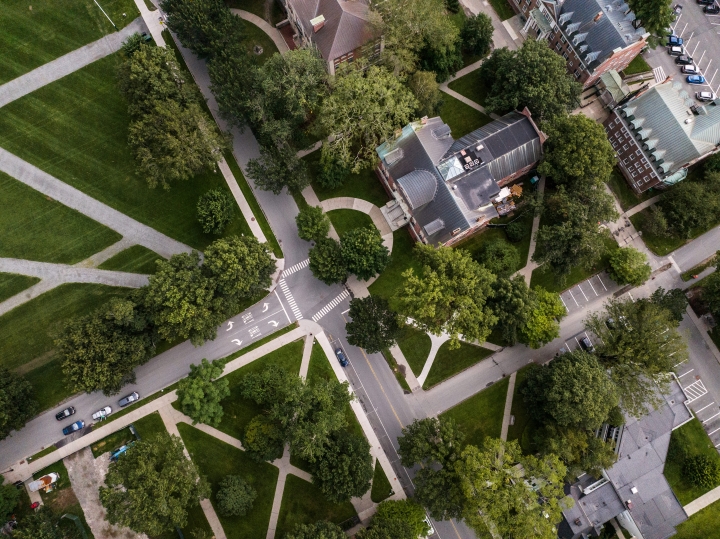How can and should Dartmouth’s institutional resources—from the forests of the Second College Grant to the Organic Farm and the central campus itself—be harnessed as laboratories for experiential learning and nationally distinctive research programs about climate change?
That is the central question of the Climate Futures Initiative, a year-long effort to identify Dartmouth’s strengths and opportunities for climate scholarship and education locally, regionally, nationally, and internationally. The initiative is being led by Professor of Anthropology Laura Ogden, who was recently appointed special advisor to the provost on climate and sustainability.
CFI is one of several key pillars of Dartmouth’s commitment to meaningful action to address climate change and sustainability—a priority that President Sian Leah Beilock outlined in her Inaugural address in September, pledging an aggressive push for the campus to achieve real carbon zero and to become a world leader in developing innovative, sustainable, and human-centered cold-weather climate solutions.
“The goal of the Climate Futures Initiative is to capitalize on Dartmouth’s extraordinary community of scholars and students and our unique sense of place in rural New Hampshire to maximize our academic impact on climate-related issues,” says Provost David Kotz ’86.
Throughout the spring and fall, Dartmouth faculty are invited to participate in a series of three CFI colloquia to explore how the campus can become a lab for climate study and innovation. Complementary colloquia can begin to form around interdisciplinary faculty research initiatives to leverage competitive extramural research funding in support of national and international initiatives.
The sessions are intended to encourage open and expansive faculty participation in the conversation around climate change, with a goal of understanding what other professors are doing in this space, coming up with actionable ideas for future research and teaching engagements, and creating community.
“While pursuing multiple academic initiatives, we want the concept of ‘campus as lab’ to become one model that encourages integrative and creative thinking spanning the humanities, arts, sciences, and applied fields. In addition, we want to look well beyond the campus to train scholars for a world facing the challenges of a changing climate,” Ogden says.
The first three faculty colloquia to explore the “campus as lab” model include:
- Campus Decarbonization and Geothermal Energy Transitions, chaired by Meredith Kelly, professor of earth sciences. Noon to 3:30 p.m., May 1.
- Dartmouth’s Organic Farm, chaired by Theresa Ong, assistant professor of environmental studies. Noon to 3:30 p.m., May 3.
- The Second College Grant, chaired by Matt Ayres, professor of biological sciences. Sept. 13 (time TBA).
To register for the colloquia, faculty should email Laura.A.Ogden@Dartmouth.edu.
Ogden says plans for other CFI programs are in the works on topics that include faculty pilot projects, Arctic and northern climates research, campus-wide curriculum efforts on climate change, student engagement, and strengthening Dartmouth’s global visibility in climate research.
